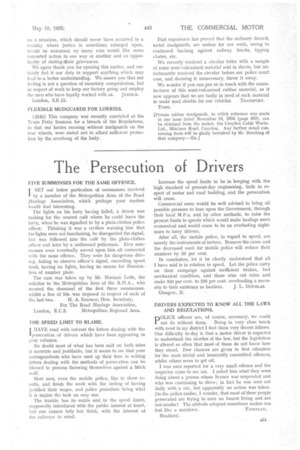The Persecution of Drivers
Page 109

If you've noticed an error in this article please click here to report it so we can fix it.
FIVE SUMMONSES FOR THE SAME OFFENCE.
SET out below particulars of summonses received by a member of the Metropolitan Area of the Road Haulage Association, which perhaps your readers would find interesting.
The lights on his lorry having failed, a driver was making for the nearest café where he could leave the lorry, when he was signalled to by a plain-clotheá police officer, Thinking it was a civilian warning him that his lights were not functioning, he disregarded the signal, but was followed into the café by the plain-clothes officer and later by a uniformed policeman. Five summonses were eventually served upon him all connected with the same offence. They were for dangerous driving, failing to observe officer's signal, exceeding speed limit, having no lights, having no means for illumination of number plate.
The case was taken up by Mr. Norman Letts, the solicitor to the Metropolitan Area of the 11.1-1.A„ who secured the dismissal of the first three summonses, whilst a fine of 10s. was imposed in respect of each of the last two. H. A. SIMPSON, Hon. Secretary, For The Road Haulage Association, London, E.C.3. Metropolitan Regional Area, THE SPEED LIMIT TO BLAME.
I HAVE read with interest the letters dealing with the 'persecution of drivers which have been appearing in your columns.
No doubt most of what has been said on both sides is accurate and justifiable, but it seems to me that your correspondents who have used up their time in writing letters dealing with the methods of persecution can be likened to persons throwing themselves against a brick Most men, even the mobile police, like to show results, and finish the week with the feeling of having justified their wages, and police procedure being what it is makes the task an easy one.
The trouble has its entire seat in the speed limits, supposedly introduced With the public interest at heart, but one cannot help but think, with the interest of the railways in mind.
Increase the speed limits to be in keeping with the high standard of present-day engineering, both in respect of motor and road building, and the persecution will cease.
Commercial users would be well advised to bring all possible pressure to bear upon the Government, through their local M.P.s, and by other methods, to raise the present limits to speeds which would make haulage more economical and would cease to be an everlasting nightmare to lorry drivers.
After all, the mobile police, in regard to speed, are merely the instruments of torture. Remove the cause and the decreased need for mobile police will reduce their numbers by 50 per cent.
In conclusion) let it be clearly understood that all I have said is in relation to speed. Let the police carry on their campaign against inefficient brakes, bad mechanical condition, and those who cut rates and make 100 per cent: to 200 per cent, overloading a neces
sity to their existence as hauliers. J. L. DOUGLAS. Glasgow, N.
DRIVERS EXPECTED TO KNOW ALL THE LAWS AND REGULATIONS.
POLICE officers are, of course, necessary, we could not do without them. Being in very close touch with most in my district I find them very decent fellows. One difficulty to-day is that a motor driver is expected to understand the niceties of the law, but the legislation is altered so often that most of them do not know how they stand. Few chances are given -to first offenders for the most trivial and innocently committed offences, whilst others seem to get off.
I was once reported for a very small offence and the inspector came to see me. I asked him what they were doing about a person whose licence was suspended and who was continuing to drive; in fact he was seen out daily with a car, but apparently no action was taken. Do the police realise, I wonder, that most of these people persecuted are trying to earn an honest living and are not crooks? The attitude adopted sometimes makes one feel like a murderer. FAIRPLAY. Bradford.




































































































































































